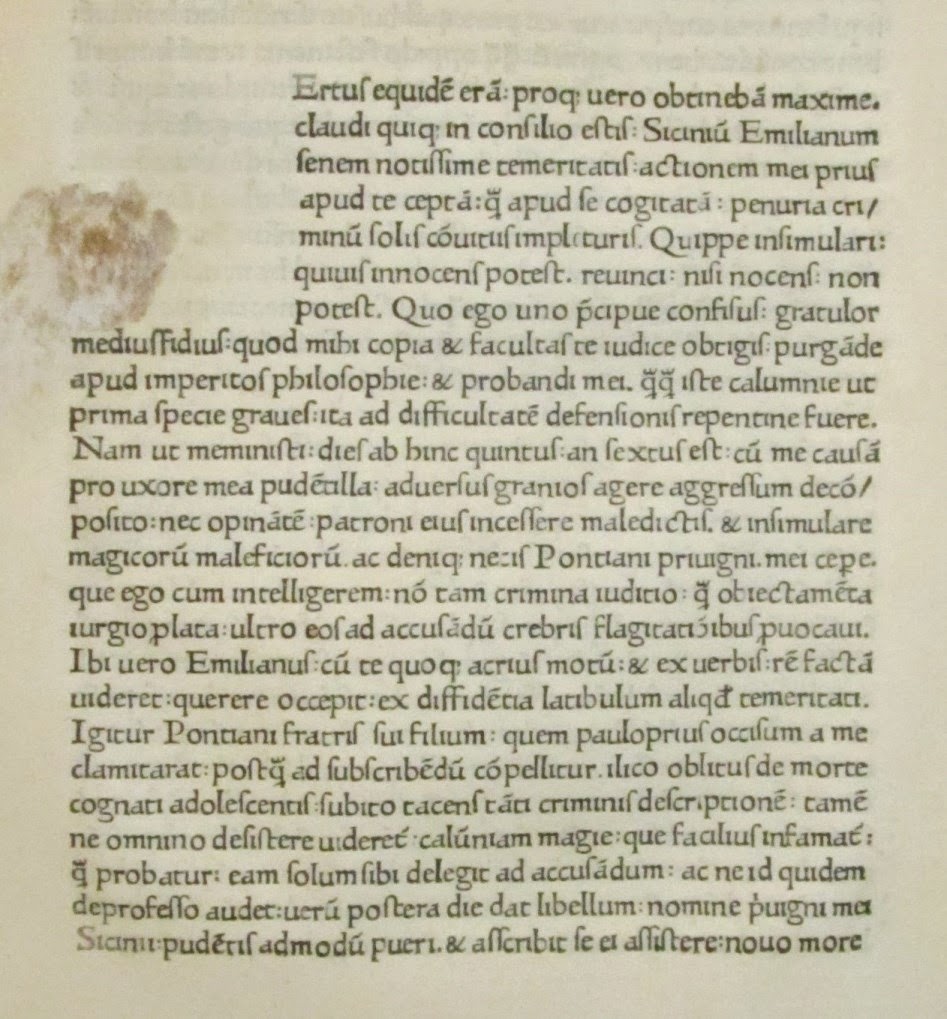Act III: All Apologies
 |
| Opera [Works] of Apuleius. Rome: Petri de Maximo, 1469 (edition princeps). The Rosenbach of the Free Library of Philadelphia, Incun469a. |
Within this fiasco-themed mini-series we’ve so far looked at collections that hint at theatrical and political debacles. This final act concerns a legal fiasco, and this one goes back to the ancient world—Roman North
Africa, precisely. Not far from Tripoli a famous trial took place
in the second century CE. The plaintiff
was one Aemilianus. He was a member of a
family that believed they had been aggrieved by a young man who had married
Aemilianus’s sister-in-law, Pudentilla, then a widow.
The young man and the defendant in the suit was Apuleius of Madaurus, an educated
Roman citizen, Platonic philosopher, and author of The Golden Ass, the only surviving
ancient novel in Latin.
While the latter is Apuleius’s best-known work and probably his most significant, his court defense–known as his Apologia–is an overlooked literary gem. It was first printed in Rome in 1469, as you can see from this edition in our collection of incunabula. The Apologia is a
witty and spirited defense, which proved a disaster for Aemilianus and his
co-plaintiffs. The background of the
case is exceedingly complicated, but it came down to who would inherit
Pudentilla’s wealth: her sons (backed by their late father’s family, including
Aemilianus, as well as their in-laws), or her new husband Apuleius? To keep the wealth in the family they needed to undermine Apuleius,
so Pudentilla’s sons and in-laws accused him of bewitching her with magic
spells and potions. They presented their
first piece of evidence to an indignant populous in the forum, reading a fragment of a
letter that Pudentilla had written mentioning that, “Apuleius is a magician. He has bewitched me and I love him too
much.” Pudentilla’s in-laws used this as the pretext to charge Apuleius with being a magician. They promptly presented evidence that Apuleius had committed various sorceries against several different people.
 |
| The beginning of the Apologia. The Rosenbach of the Free Library of Philadelphia, Incun 469a. |
ancient Roman courtroom defense qualify as a fiasco? Because a key ingredient in any good fiasco
is ridiculousness, and Apuleius found the proceedings against him to be utterly ludicrous, so he decided to fight fire with fire. His defense is a bitingly sarcastic, disdainful, and hilarious dismantling of his opponent’s charges word for word. Nothing escaped Apuleius’s scorn, not even the brief remark in the
opening arguments that he was a “handsome philosopher.” Apuleius rebutted that he isn’t really that
handsome: “This hair, which they, with falsehood so manifest, affirmed that I
had allowed to grow to such a length, in order to add to the allurements of my
beauty—you see how far it is from being handsome and neatly arranged—all
clogged and matted together, like the rope of a twisted tow, shaggy and
uneven… . The charge, then, as to my hair, which they have made as it were a
capital count in the indictment, has, I fancy, been sufficiently refuted.” (I’m quoting from a 1878 English edition by an anonymous translator printed in London by George Bell & Sons).
His opponents tried to use Apuleius’s own poetry against him, pointing out verses that they felt had lascivious or shameful connotations. They didn’t pick particularly damning poems, however. One of them had to do with dentifrices–tooth powder! Apuleius seizes on this to deliver a mocking oration on oral hygiene, which reportedly sent the crowd of spectators into hysterics and which he ended with, “If, indeed, a person, like yourself Aemilianus, will hardly ever open his mouth except to utter calumnies and revilings, I am clearly of the opinion that he ought to bestow no attention whatever on his mouth, nor to clean his teeth with powders brought from abroad, when he might much more appropriately rub them with charcoal snatched from the funeral pile.”
Apuleius spun outrageous comedy out of the most absurd assumptions of his accusers, discoursing on such topics as mirrors, fish, napkins, and whatever other subjects he could use to insult his accusers and expose their ridiculous charges. In this way, Apuleius’s defense was his best offense, essentially prosecuting his accusers for slander, stupidity, illiteracy, and bad taste. The crowd loved it and the Roman proconsul who acted as judge in the trial duly acquitted Apuleius of being a nefarious magician. For Aemilianus and his scheming family, the trial was truly a fiasco; for us, it’s some of the most entertaining courtroom drama you could ask for!
Patrick Rodgers is Curator of the Maurice Sendak Collection at the Rosenbach of the Free Library of Philadelphia.


